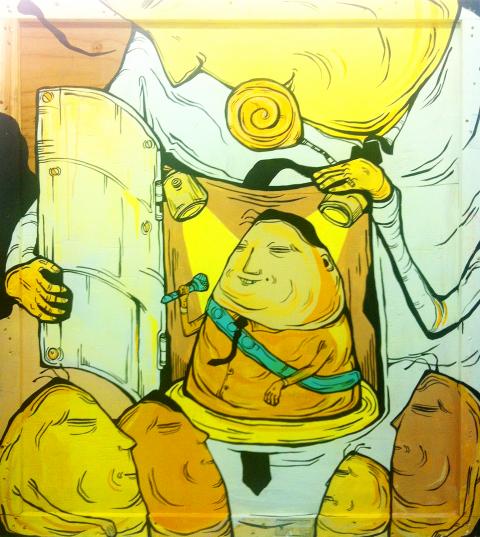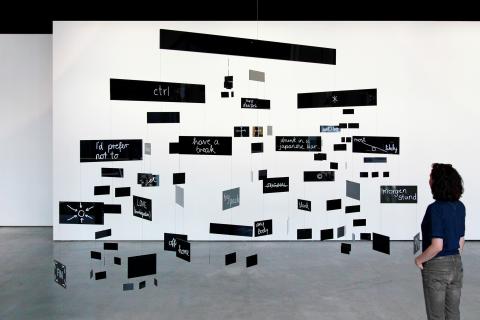Camouflage is a solo exhibition by Emma Hack, the skin artist behind Gotye’s Somebody I Used to Know . Hack is displaying 15 photographs from three projects, including Birds of Prey — live birds in painted trees — and Wallpaper Mandela, hand-painted women who blend seamlessly into intricate floral wallpaper.
■ Bluerider Art, 9F, 25-1, Renai Rd Sec 4, Taipei City (北市大安區仁愛路四段25-1號9樓), tel: (02) 2752-2238, open Tuesdays to Sundays from 9am to 6pm
■ Until Oct. 6

Photo courtesy of Bluerider Art
Seminal photographer Chang Chao-tang (張照堂) brings 400 works from his career to solo exhibition Time: The Images of Chang Chao-tang (歲月). Pieces, which date from 1959 to the present, include never-before-seen portraits, a series taken with a cell phone, eight documentaries and TV programs, notes, sketches and two “exhibitions within an exhibition” — replicas of experimental installations from the 1960s. Together, they’re a record of a pioneering artist’s career, and of Taiwan’s sweeping sociopolitical changes over the same period. Chang is winner of the Golden Bell, National Award for Arts and the Executive Yuan’s National Culture Award for lifetime achievement.
■ Taipei Fine Arts Museum (TFAM, 台北市立美術館), 181, Zhongshan N Rd Sec 3, Taipei City (台北市中山北路三段181號), tel: (02) 2595-7656. Open Tuesdays to Sundays from 9:30am to 5:30pm and until 8:30pm on Saturdays

Photo courtesy of Yo Gallery
■ Opens tomorrow. Until Dec. 29
In 1986, German sociologist Ulrich Beck coined the term “risk society” to describe how the future world will have little time for wealth production, as it will be occupied with managing human-created “risks” such as global warming. Risk Society (風險社會) features young Germans who believe that the risk society has already become a reality. Curated by Melanie Bono, 22 German artists present mixed-media installations organized under four themes: Micro-Macro; Detachment and Disenchantment; We Are All Individuals; and New Models of Collaboration. Matthias Fritsch is showing his silent film with live accompaniment by Taiwanese band Nighteentael (十九兩).
■ Museum of Contemporary Art, Taipei (MOCA, Taipei), 39 Changan W Rd, Taipei City (台北市長安西路39號), tel: (02) 2552-3720. Open Tuesdays to Sundays from 10am to 6pm. General admission: NT$50

Photo courtesy of MOCA, Taipei
■ Opens tomorrow. Until Nov. 10
The Grime Casebook (髒兮兮事件簿) features graffiti art by AhdiaOne (阿迪啊萬) and Candy Bird. Their themes cover “dirty” social phenomenon such as forced land development and politicians who are well-dressed but corrupt to the core.
■ Yo Gallery (悠畫廊), Store B44, Creative Area, Zhongshan Metro Mall, Taipei City (臺北捷運中山地下書街 文創區B44展間), tel: (02) 2563-3151, open Tuesdays to Sundays from 1pm to 8:30pm
■ Opening reception today at 6:30pm. Until Oct.13
In Memory of the Minimalist Master (紀念台灣極簡主義宗師) presents the legacy of Richard Lin (林壽宇, 1933-2011), a Taiwanese painter who made his name in London. Jia Art Gallery’s retrospective show includes his earlier abstract paintings and 10 classical pieces from the White series, which use different shades of white to embody states like thin, wet and dry.
■ Jia Art Gallery (家畫廊), 1F-1, 30, Zhongshan N Rd Sec 3, Taipei City (台北市中山北路三段30號1樓之1), tel: (02) 2595-2449. Open Tuesdays through Sundays from 10am to 6pm
■ Until Sept. 29

Every now and then, it’s nice to just point somewhere on a map and head out with no plan. In Taiwan, where convenience reigns, food options are plentiful and people are generally friendly and helpful, this type of trip is that much easier to pull off. One day last November, a spur-of-the-moment day hike in the hills of Chiayi County turned into a surprisingly memorable experience that impressed on me once again how fortunate we all are to call this island home. The scenery I walked through that day — a mix of forest and farms reaching up into the clouds

With one week left until election day, the drama is high in the race for the Chinese Nationalist Party (KMT) chair. The race is still potentially wide open between the three frontrunners. The most accurate poll is done by Apollo Survey & Research Co (艾普羅民調公司), which was conducted a week and a half ago with two-thirds of the respondents party members, who are the only ones eligible to vote. For details on the candidates, check the Oct. 4 edition of this column, “A look at the KMT chair candidates” on page 12. The popular frontrunner was 56-year-old Cheng Li-wun (鄭麗文)

“How China Threatens to Force Taiwan Into a Total Blackout” screamed a Wall Street Journal (WSJ) headline last week, yet another of the endless clickbait examples of the energy threat via blockade that doesn’t exist. Since the headline is recycled, I will recycle the rebuttal: once industrial power demand collapses (there’s a blockade so trade is gone, remember?) “a handful of shops and factories could run for months on coal and renewables, as Ko Yun-ling (柯昀伶) and Chao Chia-wei (趙家緯) pointed out in a piece at Taiwan Insight earlier this year.” Sadly, the existence of these facts will not stop the

Oct. 13 to Oct. 19 When ordered to resign from her teaching position in June 1928 due to her husband’s anti-colonial activities, Lin Shih-hao (林氏好) refused to back down. The next day, she still showed up at Tainan Second Preschool, where she was warned that she would be fired if she didn’t comply. Lin continued to ignore the orders and was eventually let go without severance — even losing her pay for that month. Rather than despairing, she found a non-government job and even joined her husband Lu Ping-ting’s (盧丙丁) non-violent resistance and labor rights movements. When the government’s 1931 crackdown